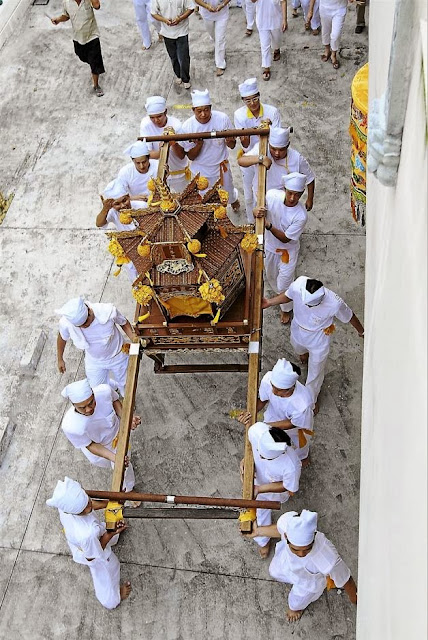Star Online : Community
Chinese and Hindus pray and celebrate festivals for nine days
TODAY (5.10.2013) is the start of two major festivals for the
Chinese and Hindus in Malaysia, the Nine Emperor Gods and Navarathiri
respectively. Though separated by beliefs, the festivals share some common practices.
The Nine Emperor Gods festival is named after the Nine Emperor Gods begotten by the supreme goddess in Taoism. The number nine
signifies the Nine Emperor Gods Navarathiri or “Nine Nights festival”, meanwhile, is a festival
dedicated to the worship of the Hindu mother goddess known as Shakthi or
Amman. Navarathiri literally means nine nights as “nava” means nine and “ratri” means nights and pays homage to the three
forms of the mother goddess.
Besides celebrating the festival for nine days, the two festivals also
coincide on the same nine days in the same month of the lunar calendar this year.
During this time, Hindu and Taoist devotees observe a period of fasting
and offer prayers to the mother goddess and the nine emperor gods
respectively.
During the nine days, devotees of both religions
follow a strict vegetarian diet. Some Hindu devotees choose to abstain
from foods or activities that they enjoy. During the nine days, prayers are offered for blessings of health, prosperity and wisdom.
Navarathiri is celebrated differently in various parts of India.Universiti Malaya Department of Indian Studies senior lecturer G.
Sivapalan said the festival in north India was celebrated with much
fervour, by fasting on all nine days while worshipping the mother
goddess in her different forms.
He said in South India, the
Tamils, Malayalees and Telugus celebrate Saraswathi Puja and Ayuda Pujai
in a grand manner, and that books and tools of the trade were
worshiped.The books are placed at the altar for prayers in
houses or in temples. The nine days are divided into sets of three days,
where three different aspects of the supreme goddess are worshipped.
“The first three days are devoted to Durga in order to destroy evil and grant good tidings.The second three days mark the time where the goddess Mahalakshimi is worshipped as a giver of all forms of wealth.
The final three days are for worshipping the goddess of wisdom or education, Saraswathi,” Siva said.
During the last three of the nine-day celebration, children will bring
their books and stationery to the temple so that they may be blessed
with a good education. For Nishaaleni Raju, 24, and her
siblings, this is a time to seek blessings from their vocal teachers
whom they revere as their guru. This is done on the 10th day or what is called Vijayadashami Day.
“On this day, we make offerings of fruits or flowers to our guru,” she said.
On Vijayadashami Day, books are ceremoniously taken out for reading and writing, after worshipping Saraswathi. The day is also considered auspicious for initiating children into writing and reading, which is called Vidyarambham. Tools and objects used in one’s daily life or to make a living are central to this celebration. The 10th day is celebrated as it also marks the day where the mother
goddess defeated a demon after fighting for nine days and nights. It
also marks the cleansing of bad spirits by the goddess.
“It is
believed that any new venture, such as starting a business or buying
new household items on this day, is bound to bring success and
prosperity,” Sivapalan said.
There is also a tradition not
commonly practised here during the Navarathiri festival. It is the
selection of little girls to sit at the altar in the temple to represent
the different forms of the mother goddess each night.
P. Nathan, 41, a devotee of a temple in Cheras, said the little girls were usually selected by their religious teachers.
“They range between the ages of five and 10, and are dressed up as goddesses,” he added.
Meanwhile, the Nine Emperor Gods Festival is only celebrated by Taoist Chinese. Universiti Malaya Chinese Studies Department senior lecturer Prof Dr
Yam Kah Kean said the recurring significance of the number nine in this
festival was because of the Nine Emperor Gods in Taoism.
“But strictly speaking, devotees usually begin fasting on the eve of the first day, or even earlier,” said Prof Yam. In contrast to Navarathiri, as the nine days of prayers are not divided for each of the Emperor Gods.
However, there are practices that are traditionally specific for
certain days of the festival, such as the Bridge Crossing ceremony on
the eighth day and the Fire Walking ceremony on the ninth day.
One of the main highlights of the Nine Emperor Gods Festival celebration
in Malaysia are the mediums who go into a state of trance and become
vessels for the nine gods.
“However, the practice of using trance mediums deviates from what is considered orthodox Taoist
theology, and is associated more with local folk beliefs,” said Prof Yam.
Some of these beliefs have also associated the Nine Emperor Gods with
waterways, as evident during the invitation and send-off ceremonies for
the Nine Emperor Gods at the seaside or river.
Some devotees are divided in the belief that the increased prevalence of rain during the nine days is linked to the festival.
A 63-year-old woman who only wished to be known as Soo, a devotee of a
temple in Ampang, claimed the rain served to cleanse the road for the
transportation of the Nine Emperor Gods. Others such as Jocelyn
Teh, 22, are not sure of its significance, and feel the changing of the
monsoon seasons seems a more plausible explanation for this phenomenon.
“My family usually only visits the temple on one day,” said Teh, whose family lives in Taiping.
Whatever the beliefs, the Nine Emperor Gods and Navarathiri festivals
remain an important part of the Taoist and Hindu culture in Malaysia.


























